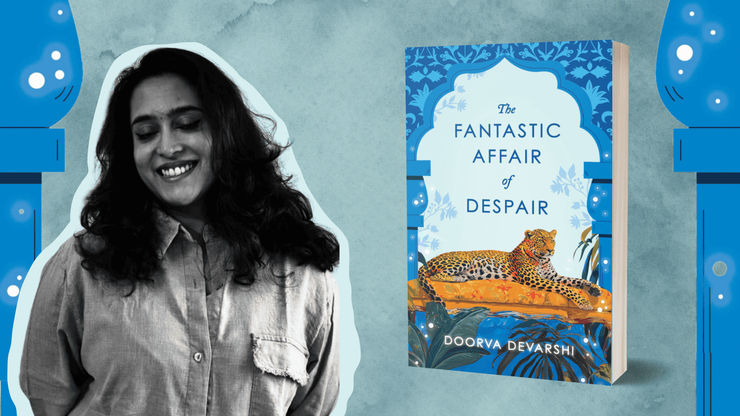The Fantastic Affair of Writing (and Editing) a Book
We interviewed author Doorva Devarshi and editor Shreyoshee Bandyopadhyay for their thoughts on The Fantastic Affair of Despair, a debut novel that explores the infinite connections and ruptures that make us human.

In this insightful interview, author Doorva Devarshi and editor Shreyoshee Bandyopadhyay share their thoughts on The Fantastic Affair of Despair, exploring its themes of interconnectedness, moral complexities, and the journey from conception to publication.
Describe The Fantastic Affair of Despair in a few words. What does the book mean to you?
Doorva: It is a story of the shape that memories take in us and the people we meet and those they meet. It is about a kind of infinite interconnectedness of humanity. It has come to mean a lot to me over the years since its conception to its publication. Initially, it meant just something I want to try my hands at. Then it became an obsession, then a passion, a ‘dream’ to put it in the simplest words. Now it is a first born – extremely special. As for its theme, its sometimes harrowing, sometimes funny, sensitive. Its many things as life is. It means like everyday to me.
Shreyoshee: I think Doorva has managed to capture what’s most special about the novel in its title: it is truly fantastic, and full of despair. Maybe I would add ‘unassuming’ to that list – it creeps up on you in quiet ways. To me, The Fantastic Affair of Despair is quite simply a treasured favourite. Perhaps editors are supposed to be a neutral voice, but this is not the kind of book that leaves your sense of objectivity intact.
Are there any themes or messages you hope readers will take away from this book?
Doorva: A large section of the book is told through perspectives. She is still the narrator but it is as if she steps into the shoes of others. The baton is passed – ‘You tell your story now’. It is not always a good story and the intention is not empathy. The intention was maybe to understand that our actions have massive consequences. As we get older, it becomes imperative to understand ourselves first so that we do not perpetuate a cycle of negativity.
Shreyoshee: One of the things that Doorva does really well is avoid didacticism while still addressing a lot of heavy topics with considerable moral weight. I felt like a voyeur observing these often-earthshattering moments in the lives of characters we only briefly get to know. This leaves you with a sense of helplessness, but it also taps into your own emotions and assertions about big ideas like nationhood, the patriarchy and our rapidly depleting Earth. Rather than a pre-packaged message, I think TFAD will challenge readers to confront these uncomfortable realities.
‘As we get older, it becomes imperative to understand ourselves first so that we do not perpetuate a cycle of negativity.’
Doorva Devarshi
Why did you write this story? / Why did our editorial team choose to publish this story?
Doorva: I wish I had a romantic answer to this question. To be honest, I don’t even remember why I started. I just remember sitting with my friend, Shivranjani, at JLF and casually telling her that I’m thinking of writing a story. I wanted to a write a Woman vs Beast story. There’s plenty of man vs beast. The Old Man and the Sea. Moby Dick. (Needless to say, this not even close to a comparison) The next memory I have related to this novel is nursing my cat who had had an accident and working on the book.
Shreyoshee: This was one of the first submissions I came across in my time at PMI and I felt this instant sense of connection with it – one that I’ve seen replicated with every new reader. It was such a pleasant surprise, to find a debut crafted with such confidence and skill while bursting at the seams with the raw feeling that is unique to first books. We had to have it on our list!
How did you decide on the book's structure, and were there any changes during the development process?
Doorva: For a couple of months, I had let the story brew in my mind without putting anything down. I don’t really know if this is a method that others employ or if it is even recommended. There was a kind of breaking point when I felt like I would explode if I didn’t right it down. I vividly recall an afternoon of restlessness. I picked up a notebook and set down a story in three parts. I started with Part 3 because I knew the ending, then Part 1 and lastly part 2. I wrote the first draft over a few months, and threw it away.
I began working on the second draft which took maybe around 10 pages from the original draft, the basics of the original story, the character names, and settings.
There was no plotting for the second draft. I think I can safely say there were changes during the development process.
Shreyoshee: We had a chance to meet Doorva early in the process, and from that first conversation I really liked the clarity with which she knew her novel. With that in mind, TFAD did not change much during the (editorial) development process – instead we worked on very minute details that the novel draws particular attention to.
What role do you think this book plays in its specific genre?
Doorva: That is a very big question! I will let Shreyoshee answer it.
Shreyoshee: It’s a bit challenging for me to think about TFAD in terms of genre, though it fits into many boxes: historical fiction, cli-fi, magical realism, literature by or about women. I suppose that’s what makes it a unique offering to all its many relatives – you can see where the novel draws from these literary traditions, but it keeps you on your toes by constantly disrupting and adding to them.
The Fantastic Affair of Despair
by Doorva Devarshi
In a newly independent India, a lone woman embarks on a journey of self-discovery, enthralled by the call of a man-eating beast.
What twist of fate awaits when they come face to face?
Exquisitely observed and deeply moving, The Fantastic Affair of Despair is a powerful story of self-determination in a world bent on endangering all that is precious about us and our surroundings.



